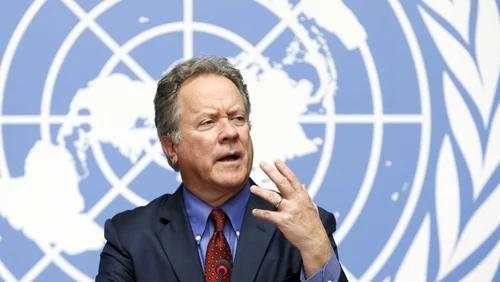UNITED NATIONS, April 21 (Xinhua) -- World Food Programme (WFP) Executive Director David Beasley on Tuesday warned of a hunger pandemic across the world in tandem with the coronavirus pandemic.
"At the same time while dealing with a COVID-19 pandemic, we are also on the brink of a hunger pandemic," he told the Security Council in a virtual briefing.
"In my conversations with world leaders over the past many months, before the coronavirus even became an issue, I was saying that 2020 would be facing the worst humanitarian crisis since World War II for a number of reasons," he said.
The wars in Syria and Yemen; the deepening crises in South Sudan and Burkina Faso and the central Sahel region; the desert locust swarms in Africa; more frequent natural disasters and changing weather patterns; the economic crisis in Lebanon affecting millions of Syrian refugees; the Democratic Republic of Congo, Sudan, Ethiopia; and the list goes on, he said. "We're already facing a perfect storm."
"So today, with COVID-19, I want to stress that we are not only facing a global health pandemic but also a global humanitarian catastrophe. Millions of civilians living in conflict-scarred nations, including many women and children, face being pushed to the brink of starvation, with the specter of famine a very real and dangerous possibility," he told the Security Council in a debate on the protection of civilians affected by conflict-induced hunger.
Up to 821 million people go to bed hungry every night all over the world -- chronically hungry. There are a further 135 million people facing crisis levels of hunger or worse, he cited the latest Global Report on Food Crisis as showing.
That means 135 million people are marching toward the brink of starvation. But a WFP analysis shows that, due to the coronavirus, an additional 130 million people could be pushed to the brink of starvation by the end of 2020, he said.
Beasley warned that there is a real danger that more people could die from the economic impact of COVID-19 than from the virus itself.
Lockdowns and economic recession are expected to lead to a major loss of income among the working poor. Overseas remittances will drop sharply. The loss of tourism receipts will damage countries such as Ethiopia. The collapsing oil prices in lower-income countries like South Sudan will have an impact significantly. And as donor countries' revenues are down, life-saving foreign aid is expected to drop.
The economic and health impacts of COVID-19 are most worrisome for communities in countries across Africa as well as the Middle East, because the virus threatens further damage to the lives and livelihoods of people already put at risk by conflict, he said.
He asked the Security Council to promote peace. "First and foremost, we need peace. As the secretary-general recently said very clearly, a global cease-fire is essential."
He asked for swift and unimpeded humanitarian access to all vulnerable communities as well as uninterrupted food supply chains. "Supply chains have to keep moving if we are going to overcome this pandemic and get food from where it is produced to where it is needed. It also means resisting the temptation to introduce export bans or import subsidies, which can lead to price hikes and almost always backfire."
The WFP is the logistics backbone for the humanitarian world and even more so now for the global effort to beat this pandemic, said Beasley.
The WFP is requesting a further 350 million U.S. dollars to set up a network of logistics hubs and transport systems to keep humanitarian supply chains moving around the world. They will also provide field hospitals and medical evacuations to the front-line humanitarian and health workers, as needed and strategically.
"If we don't prepare and act now -- to secure access, avoid funding shortfalls and disruptions to trade -- we could be facing multiple famines of biblical proportions within a short few months," warned Beasley. "The actions we take will determine our success, or failure, in building sustainable food systems as the basis of stable and peaceful societies. The truth is, we do not have time on our side. So let's act wisely, and let's act fast."
